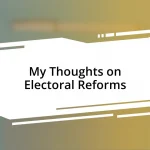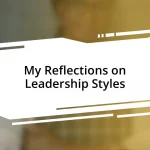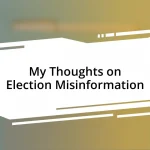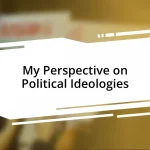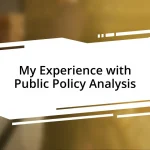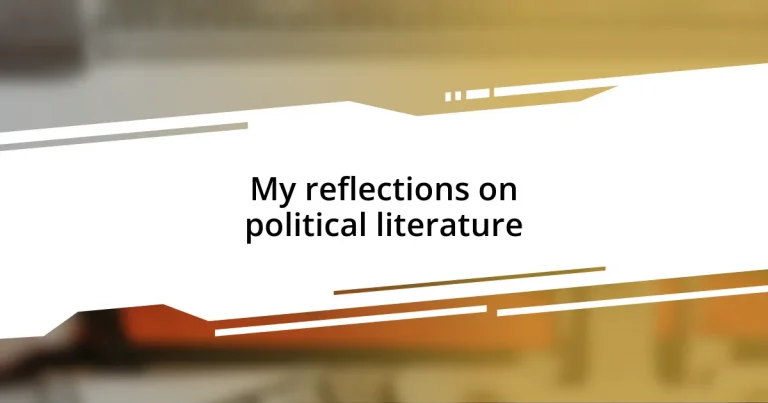Key takeaways:
- Political literature serves as a lens to understand societal complexities, often reflecting contemporary issues, such as totalitarianism and social injustice.
- Key themes in political literature include power dynamics, social justice, corruption, freedom versus control, and resistance, prompting readers to confront uncomfortable truths.
- Influential authors like Hannah Arendt, Alexis de Tocqueville, and John Stuart Mill advocate for critical understanding of power structures and individual freedoms.
- Engaging with political texts enhances critical thinking and promotes discussions on personal experiences, societal norms, and the importance of dissent in advocating for change.
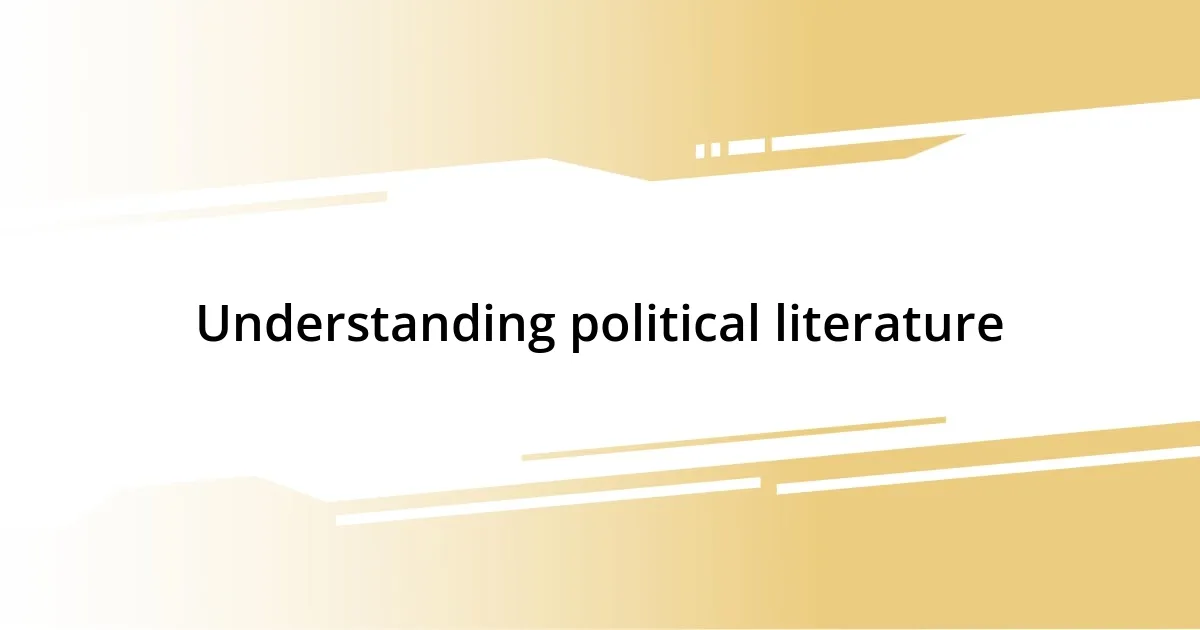
Understanding political literature
Political literature, to me, serves as a lens through which we can better understand the complexities of society. I remember reading George Orwell’s “1984” for the first time; the chilling depiction of totalitarianism felt so relevant to some modern-day events. Have you ever found yourself pondering how words can not only reflect but also shape our political realities?
A powerful aspect of political literature is its ability to evoke emotion and provoke thought. I often find myself contemplating the deep sense of injustice portrayed in works like “The Handmaid’s Tale” by Margaret Atwood, making me question the societal norms we take for granted. The raw feelings in these narratives remind us that literature can be a rallying cry for change.
Understanding political literature means grappling with both the text and its context. It’s fascinating how authors weave their personal experiences with broader political movements, influencing readers like us to reflect on our own lives. Don’t you think it’s remarkable how a single book can ignite a sense of activism, nourishing the seeds of social change?
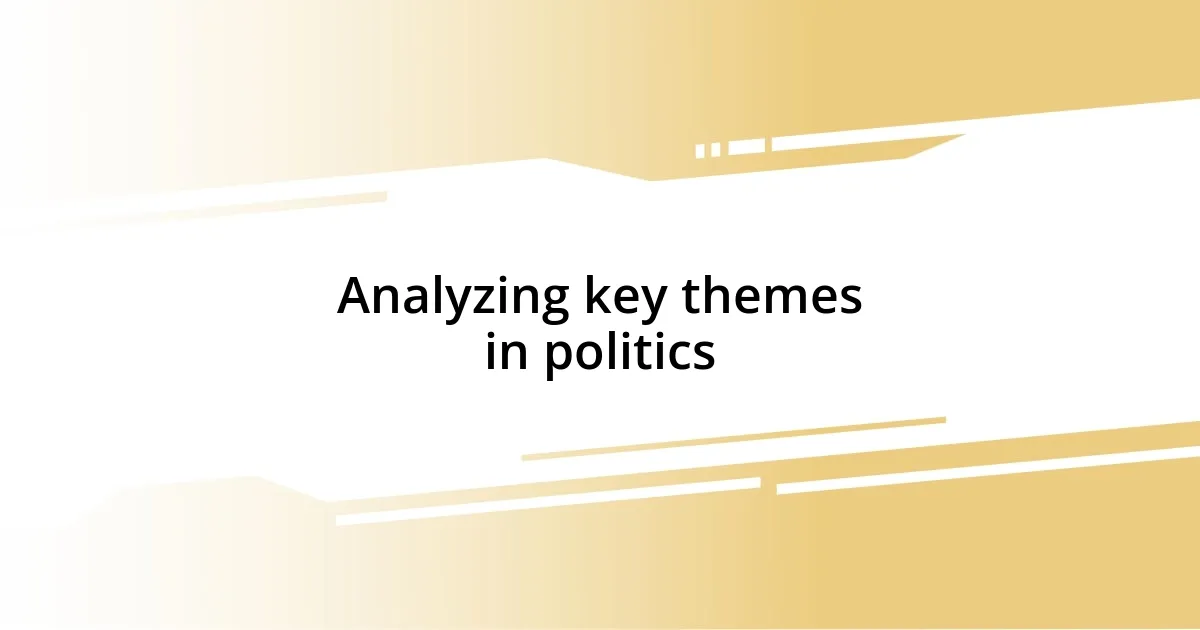
Analyzing key themes in politics
When I delve into political literature, certain themes consistently stand out. The struggle for power and its consequences strikes a chord. For example, I once couldn’t shake the feeling after reading “Animal Farm” that power often corrupts even the noblest intentions. It left me reflecting on how easily we can slide into complacency when faced with authoritative figures, even in our daily lives.
Key themes that often emerge in political literature include:
– Power Dynamics: Exploring who holds power and the means by which it is maintained.
– Social Justice: Highlighting inequalities and advocating for the marginalized.
– Corruption: Analyzing how power can lead to moral decay.
– Freedom vs. Control: The constant tension between individual liberties and authoritative governance.
– Resistance and Rebellion: The human spirit’s resilience against oppressive systems.
These threads weave an intricate tapestry that challenges us to confront uncomfortable truths. It’s like I can hear the echo of the characters’ struggles long after I close the book, reminding me of the real-world implications of their stories.
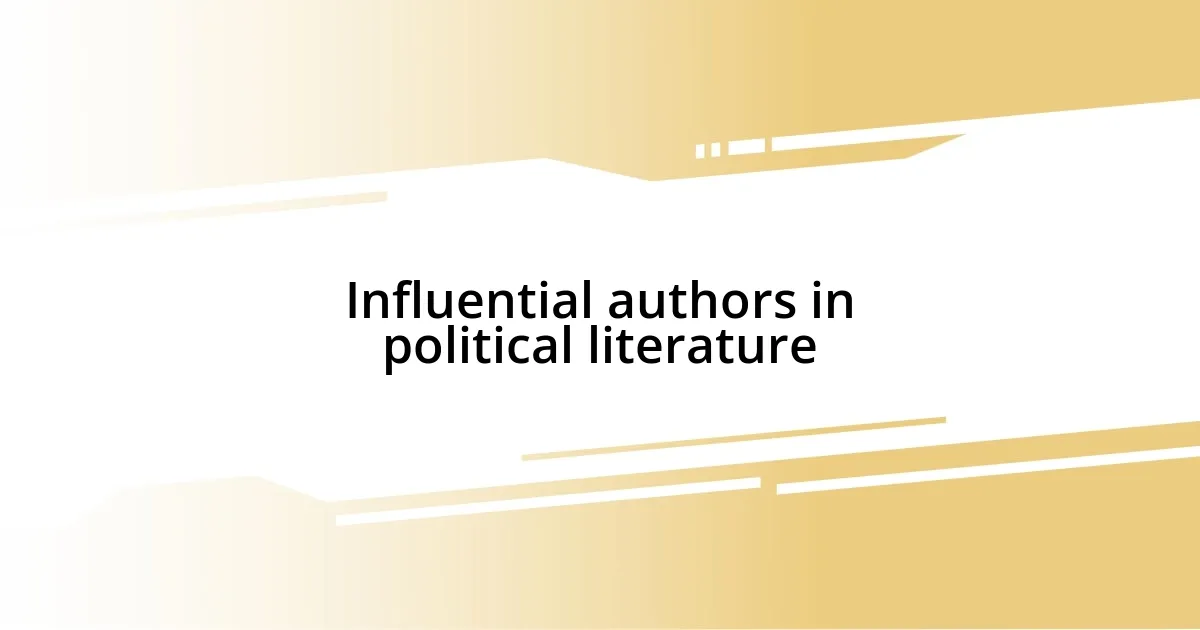
Influential authors in political literature
One author who has always resonated with me is Hannah Arendt. Her work, particularly “The Origins of Totalitarianism,” profoundly impacted my understanding of political systems. I remember wrestling with her arguments about how fear can strip away the moral fabric of society. It makes you reflect on current events, doesn’t it? Arendt’s insights remind us that we must remain vigilant and critical of power structures, or we risk repeating the mistakes of history.
Then there’s Alexis de Tocqueville, whose observations in “Democracy in America” provide a timeless perspective on political culture. I first encountered his ideas during a political science class, and I was struck by his belief that democracy is both a blessing and a burden. Have you ever considered how our pursuit of equality can sometimes lead to conformity? Tocqueville’s thoughts on individualism versus collectivism resonate with me, encouraging ongoing dialogue about the balance necessary for a healthy democracy.
Another prominent figure is John Stuart Mill, whose “On Liberty” is a cornerstone of political literature focusing on personal freedoms. When I read this work, I was inspired by Mill’s arguments about the importance of individuality in society. It reminded me how critical it is to champion diverse voices, even when they clash with the majority opinion. Isn’t it powerful how Mill emphasizes the need for open discourse? Political literature, through authors like Mill, continually pushes us to examine our values and the principles we stand by.
| Author | Key Work |
|---|---|
| Hannah Arendt | The Origins of Totalitarianism |
| Alexis de Tocqueville | Democracy in America |
| John Stuart Mill | On Liberty |
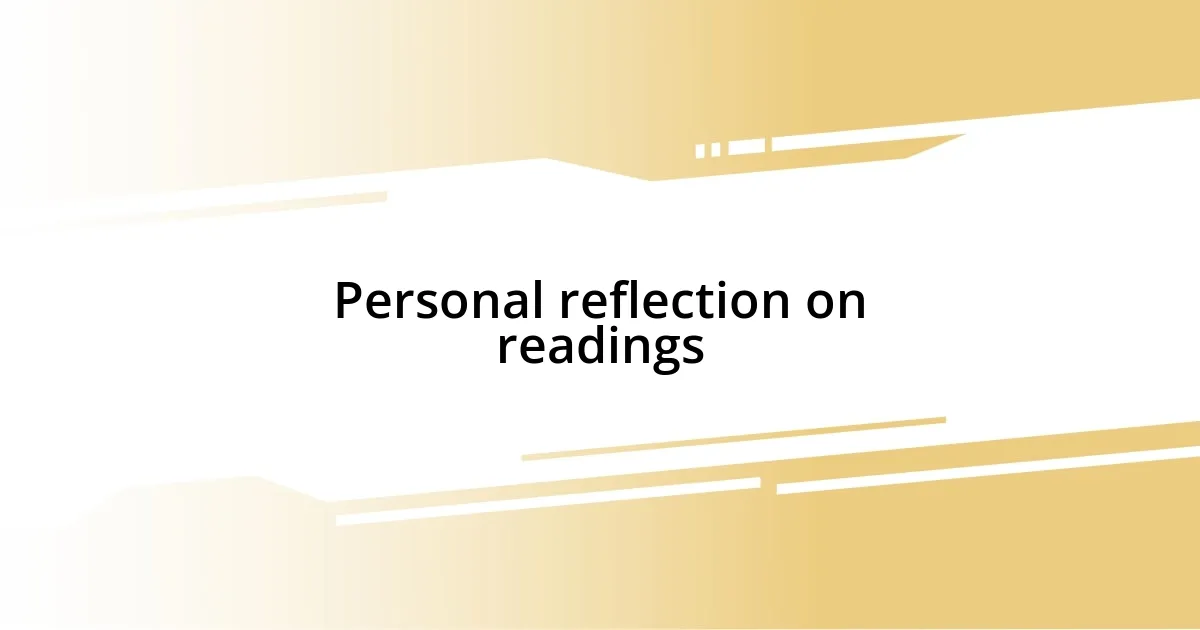
Personal reflection on readings
When I reflect on my readings, I often discover how deeply personal experiences influence my understanding of political themes. I still remember feeling a pang of recognition while reading Jacques Rancière’s works on equality. His discussions about the ways society often sidelines certain voices prompted me to evaluate my own biases. Have you ever stopped to think about how your environment shapes what you deem important? For me, that realization opened a door to questioning not just what is around me, but also what I am willing to defend or challenge.
Diving into political literature can be a bit like peeling an onion—each layer reveals something poignant and sometimes painful. One time, while immersing myself in “The Road to Serfdom” by Friedrich Hayek, I felt a mix of urgency and nostalgia. Hayek’s argument about the dangers of overreaching government policies made me reflect on conversations with my grandparents, who lived through times of significant political upheaval. It’s astonishing how literature can bridge generations, isn’t it? That connection between the past and the present intertwined in my thoughts long after I turned the last page.
Occasionally, I find that a book can strike a personal chord that I hadn’t expected. When I picked up “The Dispossessed” by Ursula K. Le Guin, I was moved by the protagonist’s struggle between idealism and reality. I couldn’t help but relate to their yearning for a world different from our own. Isn’t it fascinating how literature can evoke such emotional responses? The characters’ dilemmas reflected my own uncertainties about societal structures and what we each sacrifice in pursuit of a better future.
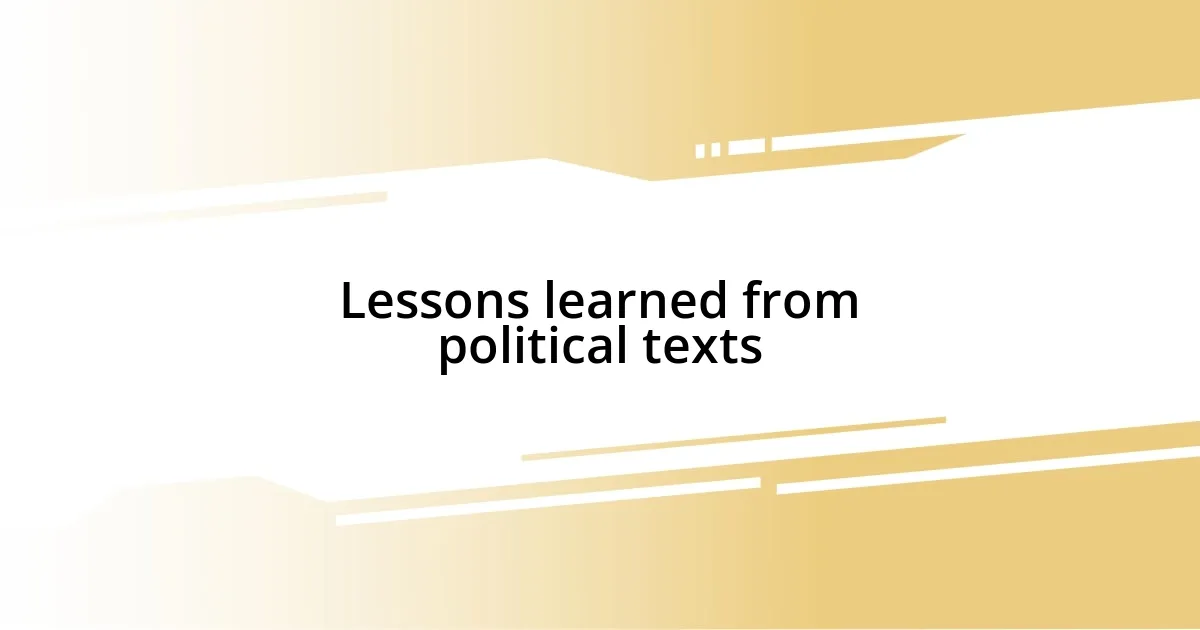
Lessons learned from political texts
Political texts can offer profound lessons that shape our understanding of society and the human experience. For instance, when I read “1984” by George Orwell in high school, I was struck by the oppressive nature of surveillance and control. I remember feeling a chill run down my spine as I realized the implications of unchecked power—truth can be manipulated, and our very thoughts can be policed. It’s staggering to consider how relevant Orwell’s insights are today in discussions about privacy and freedom.
One lesson that has resonated with me across various political texts is the importance of dissent. In “The Wretched of the Earth” by Frantz Fanon, I found not only a critique of colonialism but also a powerful call to resist oppression. His passionate prose stirred emotions in me, prompting me to reflect on the responsibility of those in power to listen to marginalized voices. Have you ever pondered how silence can be complicit in the face of injustice? It’s a stark reminder that we each play a role in advocating for change, even when it feels daunting.
Another insight that deeply impacted me comes from reading “The Prince” by Niccolò Machiavelli. Initially, I thought of it as a manual for ruthless leadership, but it struck me as a commentary on the complexities of human nature and governance. I can vividly recall moments when I discussed this work with friends, realizing just how often morality and strategy can clash in politics. Isn’t it fascinating how literature can challenge our perceptions? Machiavelli taught me that the political landscape often demands difficult choices, prompting me to consider what I value most in leadership.
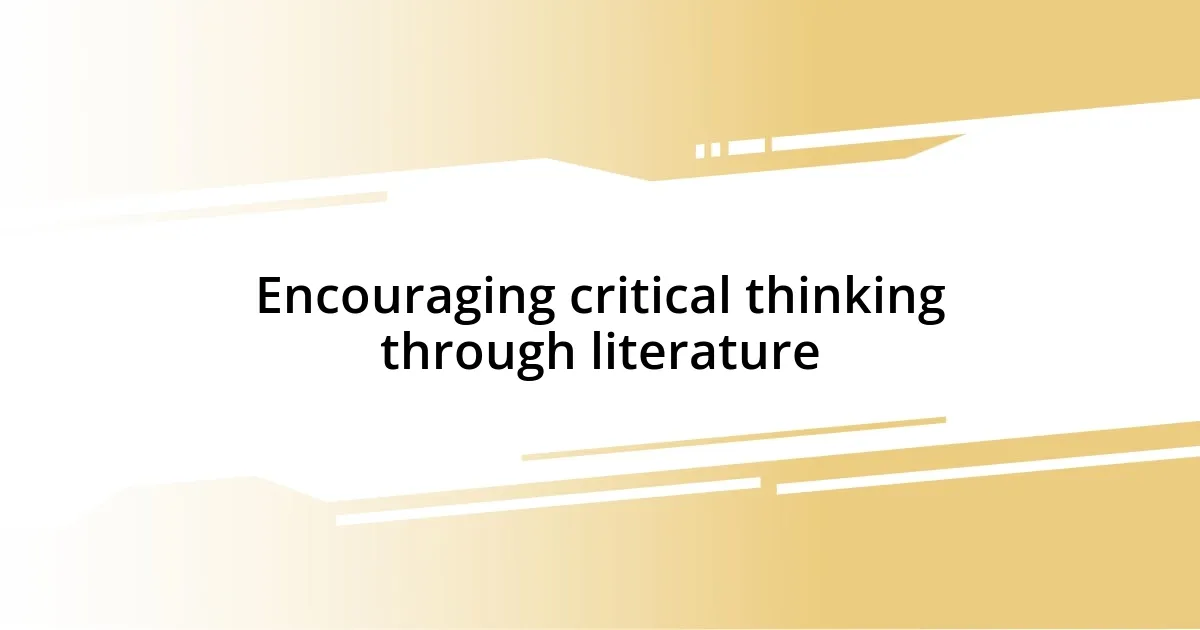
Encouraging critical thinking through literature
Engaging with literature often encourages me to question my assumptions. When I read “The Bell Jar” by Sylvia Plath, I found myself reflecting on societal expectations and mental health. Brimming with raw emotion, the protagonist’s struggles prompted me to think critically about not only my own experiences but also the experiences of others—especially regarding the stigmas surrounding mental illness. Have you ever read a character that resonates so deeply with you that it transforms the way you see the world?
Certain works have a unique power to ignite discussions that encourage critical thinking. I remember discussing “A People’s History of the United States” by Howard Zinn with a group of friends. Our conversation veered into the complexities of historical narratives and whose stories are told. Each of us brought our perspectives, unraveling how literature can shape—or even distort—our understanding of history. Isn’t it fascinating how a single text can prompt a spectrum of interpretations, challenging us to reconsider the narratives we accept as truths?
One of the most illuminating experiences I’ve had was with “The Communist Manifesto” by Karl Marx and Friedrich Engels. Initially, I anticipated a dry, theoretical read, but instead, I found a call to action that sparked intense debates within my book club. I never expected the fiery discussions about class struggle and social justice to make me reflect on my role in societal structures. It made me realize how powerful literature can be in fostering dialogue about issues impacting our daily lives. Have you ever felt compelled to engage in a conversation about what you’ve read? Literature truly has the capacity to stir our minds and hearts alike.




